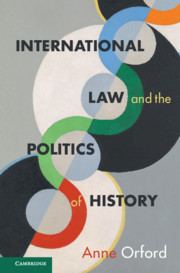Book contents
- International Law and the Politics of History
- International Law and the Politics of History
- Copyright page
- Contents
- Acknowledgements
- 1 Neoformalism and the Turn to History in International Law
- 2 Situating the Turn to History in International Law
- 3 History and the Turn to the International
- 4 History’s Lawyers
- 5 The Past in the Practice of International Law
- 6 The History of What?
- 7 Why Study the Past of International Law?
- Bibliography
- Index
4 - History’s Lawyers
Published online by Cambridge University Press: 18 June 2021
- International Law and the Politics of History
- International Law and the Politics of History
- Copyright page
- Contents
- Acknowledgements
- 1 Neoformalism and the Turn to History in International Law
- 2 Situating the Turn to History in International Law
- 3 History and the Turn to the International
- 4 History’s Lawyers
- 5 The Past in the Practice of International Law
- 6 The History of What?
- 7 Why Study the Past of International Law?
- Bibliography
- Index
Summary
This chapter argues that contemporary claims about what empiricist history can offer international law are part of a longer tradition. A particular vision of law and figure of the lawyer have been central to claims made by empiricist historians of political thought for at least a century. The chapter focuses on four influential scholars whose work has influenced the method debates in international law – Herbert Butterfield, JGO Pocock, Quentin Skinner, and Ian Hunter. It traces the figure of the lawyer as apologist for power that reappears in their texts and against which their historicizing methods are staged. While the figure of the lawyer appears in different guises – as Whig constitutionalist for Butterfield, English common lawyer for Pocock, Italian scholastic lawyer for Skinner, and Prussian natural lawyer for Hunter – in each narrative the lawyer functions as the foil for a new heroic figure. That figure, the historicizing humanist, arrives on the scene to offer an anti-metaphysical challenge to the oppressive authority of received tradition. This chapter situates debates over the turn to method in international law within that longer story, in which historians are able to take up their preordained place as radical disrupters of orthodoxy.
Keywords
- Type
- Chapter
- Information
- International Law and the Politics of History , pp. 105 - 177Publisher: Cambridge University PressPrint publication year: 2021

